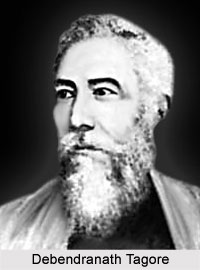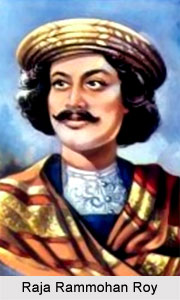 Brahmo Samaj is considered one of the most influential and powerful organisations that propelled a significant socio-religious movement in India during the British period. The organisation got huge popularity among the newly English educated elite class of India and made a huge impact on the contemporary Indian society. Brahmo Samaj operated with certain aims and objectives and propagated its own views and doctrines on various social and religious issues. The Brahmo Samaj was founded and led by the Raja Ram Mohan Roy and the sketching of the Samaj`s doctrines was also done by Ram Mohan Roy. The doctrines of Brahmo Samaj became the basic ideology for many more socio-religious movements that occurred in different parts of India during the nineteenth and twentieth century.
Brahmo Samaj is considered one of the most influential and powerful organisations that propelled a significant socio-religious movement in India during the British period. The organisation got huge popularity among the newly English educated elite class of India and made a huge impact on the contemporary Indian society. Brahmo Samaj operated with certain aims and objectives and propagated its own views and doctrines on various social and religious issues. The Brahmo Samaj was founded and led by the Raja Ram Mohan Roy and the sketching of the Samaj`s doctrines was also done by Ram Mohan Roy. The doctrines of Brahmo Samaj became the basic ideology for many more socio-religious movements that occurred in different parts of India during the nineteenth and twentieth century.
Ram Mohan Roy was counted amongst the most eminent educationalists and social reformers of nineteenth century in Bengal. He was adhered to theism and believed in worshipping only one formless God. He was also against all the evil rituals that were practised in Hinduism. Ram Mohan Roy`s personal views were nicely reflected in the doctrines of Brahmo Samaj and in fact, the base of the Brahmo philosophy was built by Roy. Ram Mohan Roy sketched the doctrines of Brahmo Samaj for the first time in a Trust Deed that was filed in 1830. According to the deed, the Brahmo Samaj would operate for a reaffirmation of egalitarianism and would worship only one deity, who is `the Eternal Unsearchable and Immutable Being who is the Author and Preserver of the Universe`. Roy also included a prohibition of all forms of idolatry and sacrifice and a ban on criticism of other religious beliefs and practices, in the deed. However, Ram Mohan Roy did not elaborate on these principles further.
 The doctrines of Brahmo Samaj sketched by Raja Ram Mohan Roy were based in the belief that once Hinduism returns to its past purity and once proper belief is reestablished, the erroneous customs such as Sati, the debarring of women from education, elaborate and useless rituals, idolatry and polytheism would disappear. The vision was based on the Vedas, Upanishads and Vedanta-Sutra and the validity of these texts were elaborated by Ram Mohan Roy in the doctrines of Brahmo Samaj.
The doctrines of Brahmo Samaj sketched by Raja Ram Mohan Roy were based in the belief that once Hinduism returns to its past purity and once proper belief is reestablished, the erroneous customs such as Sati, the debarring of women from education, elaborate and useless rituals, idolatry and polytheism would disappear. The vision was based on the Vedas, Upanishads and Vedanta-Sutra and the validity of these texts were elaborated by Ram Mohan Roy in the doctrines of Brahmo Samaj.
After Ram Mohan Roy departed for England in November, 1830 and died in 1833, the leadership of Brahmo Samaj was taken by Debendranath Tagore. Tagore fought against the Christian missionaries and also propagated theistic Hinduism. Though he accepted Vedanta, he emphasised on the superiority of Hinduism and brought about a degree of structure and ideological coherence to Brahmo Samaj. He wrote the Brahma Covenant, which was a creedal statement listing the basic obligations of membership of Brahmo Samaj. He also revised the Hindu life-cycle rituals in 1861 and gave them a particular Brahmo form.
Under the leadership of Keshab Chandra Sen, the doctrines of Brahmo Samaj underwent changes and a sense of militancy was introduced to the operations of the Samaj. Restlessness, a sharp rejection of the older values and militancy became the features of Brahmo Samaj. The Brahmos abandon the caste system and the sacred thread worn by Brahmans and also refused to practise temperance. They worked for the equality of women and started to strive for social radicalism. The first schism of Brahmo Samaj also occurred during that period, mainly because of the changed philosophies of Keshab Chandra Sen and his followers. However, the Adi Brahmo Samaj led by Debendranath Tagore continued to follow the religious doctrines of Brahmo Samaj and acted like a religious organisation dinned with rituals and theology. This section of Brahmo Samaj was not inclined to social reform and devoted much of its attention to the defence of Hinduism from the missionary criticisms.
The doctrines of Brahmo Samaj laid major emphasis on the worship of one formless omnipresent God, who has no name, designation or title. The Samaj always opposed the evil practices of Hinduism and strongly cited scriptural sources to justify their contention that the practices were not required by Hindu law. They also described them as erroneous accretions. The Brahmo doctrines believe that God and his presence are proven by the complexity of reality. The philosophy envisions God as the "almighty superintendent of the universe". According to the doctrines of Brahmo Samaj, the debarring of women from education should be opposed and the elaborate and useless rituals, idolatry and polytheism should disappear. The Brahmo philosophy has no faith in any scripture as an authority; has no faith in Avatars; the philosophy denounces the polytheism and idol-worship and also opposes the caste restrictions.



















